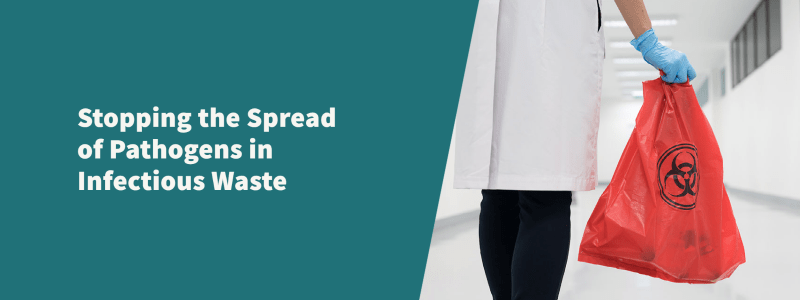A pathogen is a bacterium, virus or other microorganism that can cause disease. When disposing of infectious waste, it’s vital to carry out the proper actions to prevent pathogens spreading.
Infectious Waste
Waste of an infectious nature has the potential to cause serious illness, death or damages the environment.
These potential hazards increase when the waste isn’t treated in the right way, or is stored, transported, disposed of or otherwise managed incorrectly. Because of this, there are specialist treatment and disposal procedures to minimise the danger of infectious waste.
Does Your Business Handle Infectious Waste?
A range of business types produce infectious waste. Some of these include:
- General Practice surgeries
- Dentists
- Hospitals
- Clinics
- Nursing homes and nurseries
- Beauticians
- Various bodily treatment services
Waste is considered infectious when it has:
- Cultures and stocks of infectious agents
- Pathological contents
- Human blood and blood products
- Sharps used in patient and animal care
- Laboratory usage
- Dialysis usage
Disposal Responsibility
The party that created the infectious waste are the ones that are responsible for getting rid of it. This means business owners, “responsible persons” and those physically handling the waste at its origins are to be held responsible.
This owner responsibility remains present even when there are other parties involved in handling the waste. This is why it’s important for business owners to ensure their waste disposal methods are properly accredited – i.e. using a professional provider with a waste carrier licence.
Business owners should also be aware of local regulations. At Direct365, we make sure that we’re aware of any new laws to ensure you are always covered.
Ways to Stop the Spread
Identify the Waste
Recognition is the first way to ensure waste is dealt with properly. Once the waste is classified as infectious, it should always be separated from other waste streams. Businesses should then make sure that the waste is contained properly.
Minimise Exposure
One problem with infectious waste is the possibility of “occupational exposure”. Because of risks associated with being around infectious materials, handling the waste should be performed in an efficient manner (minimising the potential for exposure).
Decontaminate
Treatment should be applied on the waste to decontaminate it – certain specialist businesses may perform this themselves, but usually this is done at a waste treatment site after disposal.
Educate and Implement
Ultimately, it’s up to business owners to educate themselves and employees regularly and ensure these safe practices are strictly implemented. In the UK, this responsibility lies within all businesses’ Duty of Care.
The most important thing for anyone involved in handling infectious waste is to stay informed on advancing hygiene and waste management practices and make public health a priority.
Trust in Accredited Waste Carriers
If you’re looking for a Waste Disposal Provider you can rely on, look no further. To find out more about our clinical and healthcare waste services, visit our Clinical Waste Disposal & Collection section of our website.

